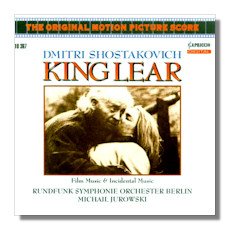
The Internet's Premier Classical Music Source
Related Links
- Shostakovich Reviews
- Latest Reviews
- More Reviews
-
By Composer
-
Collections
DVD & Blu-ray
Books
Concert Reviews
Articles/Interviews
Software
Audio
Search Amazon
Recommended Links
Site News
 CD Review
CD Review
Dmitri Shostakovich

- Incidental Music to King Lear
- King Lear Film Music (1970)
Jelena Zaremba, mezzo-soprano
Stanislaw Suleimanow, bass
Rundfunkchor Berlin
Rundfunk Symphonie Orchester Berlin/Michail Jurowski
Capriccio 10397 53:56
Summary for the Busy Executive: Gripping snippets.
Shakespeare's work has influenced the literature of almost every European country except France, where, for some reason, they prefer the jingle of Edgar Allan Poe. Verdi turned to Shakespeare plots, both early and late in his career. Castelnuovo-Tedesco set every Shakespeare lyric. The Germans routinely speak of "unser Shakespeare" and put their Deutschmarks where their mouths are with their prestigious Shakespeare Prize. Oddly enough, Eastern European modernism has turned for inspiration and energy to Shakespeare, with major drama theorists like Lukacs, Grotowski, and Kott, and groundbreaking performances from Russia, Poland, and Czechoslovakia.
In Russia, Pushkin caught the Shakespeare bug, probably through the echoes in Byron. Boris Godunov is the Russian Macbeth and Richard III. Tolstoy considered Shakespeare and Cervantes the foremost creators of Western literature. In the early 1930s, before the Stalinist crackdown, the avant-garde staged a production of a "Keystone Kops" Hamlet, with some fairly knockabout music from Shostakovich (his next major work would be Lady Macbeth of Mtsensk). Shostakovich's other Shakespearean work includes incidental music for a stage production of Lear, Op. 22, and music for the Soviet films of Hamlet and King Lear.
Shostakovich wrote music for over more than thirty films. In most cases, he provided wonderful music for unwatchable dogs. His two scores for the director Kosintsev – Hamlet (1964) and King Lear (1970) – adorn two fine films, if not quite Instant Masterpieces of World Cinema, like the immediately convincing Branagh's Hamlet and Kurosawa's Ran. Certainly Shostakovich contributes at least his fair share toward the merit of Kosintsev's films. To the director's credit, he began collaborating with the composer in the early stages of planning, so that Shostakovich had the luxury of time to compose and of extended give-and-take with the director – in stark contrast to the usual Hollywood method of leaving music until the last minute with a deadline for recorded score of a couple of weeks. Still, a great film or stage score does not necessarily make a great concert experience, since the composer usually gets only a few seconds – two minutes if he's lucky – to make an impact. What works as counterpoint to the image may not work alone. In this case, the longer sections come off quite well, while the snippets manage to keep one's interest. The arrangement of these cues (not necessarily in the order heard in the film) goes a long way to smoothing over difficulties.
The CD contains the music for a stage production done in the 1930s as well as for the 1970 film. The tone of the two scores differs wildly. The earlier production grins like a skull, with the heavy satire idiosyncratic to Shostakovich. For example, at one point the Fool breaks out into "Jingle Bells," to different words, of course. Merry Christmas to all. The Fool's songs in general look ahead to the cycle From Jewish Folk Poetry, just to give you some idea of the idiom. The film music takes a more straightforwardly poetic approach to the drama – symphonically grim, much like the Symphonies 10, 13, and 14. Nevertheless, Shostakovich has structured both scores in just about the same way, which reflects a consistent view of the drama. Marches and fanfares turn up continually, with large set pieces depicting storms, so that the play sings of the wars of men and nature.
Neither score makes great demands of the players, who turn in professional performances. The music overshadows considerations of playing. This means not only that the reading isn't marred by conductor's antics, but also that the conductor hasn't really penetrated the music's core. Still, Jurowski does a thoroughly capable job. I can say the same thing about the engineering.
Copyright © 1998, Steve Schwartz


















